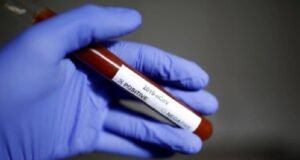
NHS bosses have made more than 20 requests for striking junior doctors in England to be allowed to cross the picket line to help out services.
None of the requests made on the first strike day have been granted so far by the British Medical Association (BMA).
The union accused NHS bosses of misusing the system known as derogation and bowing to political pressure to undermine the strike.
But NHS England said they were genuine requests for help.
It said the health service was under huge pressure after the six-day walkout began on Wednesday, and NHS bosses were trying everything they could to protect patients and keep struggling services safe.
“Given this period of industrial action coincides with the most difficult time of year for the NHS, it is to be expected that more senior medical leaders will ask for allowances to be made to ensure safe levels of cover,” the spokesman added.
The requests are made by individual departments so some NHS trusts are thought to have made more than one request. Only one request is under active consideration.
Most involve emergency care areas, such as A&E units.
This is the ninth walkout – and longest ever – by junior doctors, and before this stoppage only a handful of requests had been made.
Just one was granted – to Somerset’s Weston General Hospital in April – and that was only done temporarily as the BMA said it was misled about the scale of the problem.
In a letter to NHS England boss Amanda Pritchard on Wednesday, BMA leader Prof Philip Banfield said in many cases insufficient information was being provided by the NHS to judge the merits of the request.
He said this was “undermining” the derogation process and placing the BMA in an impossible position.
“We are increasingly drawing the conclusion that NHS England’s change in attitude towards the process is not due to concerns around patient safety, but due to political pressure to maintain a higher level of service and undermine our strike action.”
The trusts that made the requests are not being named.
But it is clear a number of areas are facing difficulties.
Routine services have been scaled back to allow senior doctors to be drafted across to emergency care to provide cover.
But several NHS trusts reported significant waits in A&E, with some declaring a critical incident, meaning bosses were concerned they could not provide critical services for patients.
Queen Alexandra Hospital in Portsmouth said its A&E department was “full” as it declared a critical incident – its third in three months.
In Nottinghamshire, the entire Nottingham and Nottinghamshire NHS system declared a critical incident at 16:30 GMT.
Cheltenham A&E has been closed with patients diverted elsewhere, and Bolton NHS Foundation Trust said it was facing “extreme pressure” with waiting times in A&E of “up to 11 hours”.
Warwick Hospital warned it was under “extreme heightened pressure”, while Airedale Hospital said its emergency department was “exceptionally busy”.
Health officials in East Sussex, South Tees, Gateshead, Greater Manchester, Berkshire, Rotherham and Harlow in Essex also reported being “busy”.
Earlier on Wednesday, one of the co-chairs of the BMA, Dr Vivek Trivedi, told the BBC that the union would be prepared to end its walkout if the government made it a fresh and “credible” offer.
However, ministers say they are not prepared to negotiate while strikes are ongoing.
In an interview with the BBC, Dr Trivedi said: “Anyone from the government could still come to us today and if we thought that offer was credible, and if we can resume talks and build on that, then we can stop our strike action for the rest of the week.”
While the BMA – which represents doctors in the UK – has asked for a 35% pay increase, he said it did not necessarily need to have that all in one go.
“We’re not even saying it has to happen in one year.
“We are very happy to look over details that would span a number of years – but what we need to do is to start a way towards that, and not further that pay erosion.”
Health Secretary Victoria Atkins said junior doctors had to call off their strike before she was prepared to get back to the negotiating table.
She said she wanted to find a “fair and reasonable solution to end the strikes once and for all”.
Junior doctors received a pay rise averaging nearly 9% this financial year – and during talks at the end of last year, the option of an extra 3% on top of that was discussed.
But those talks ended in early December without a deal being reached.
NHS bosses always warned this walkout – the ninth by junior doctors – was likely to be the most difficult.
NHS England medical director Prof Sir Stephen Powis said rising rates of respiratory illnesses, such as Covid and flu, and staff sickness were making this walkout “very challenging” in what is always one of the busiest times of the year for the health service.
There is particular concern among NHS bosses about some urgent areas of cancer care and maternity services, such as emergency caesareans.
NHS England is advising patients in a life-threatening emergency to call 999 as usual, but for everything else to use 111.
Patients who have routine appointments should attend as normal unless they have been told otherwise.
There is also expected to be some disruption to GP services.
Paul Farmer, of Age UK, said the timing of this set of strikes was particularly “alarming”.
“We are deeply concerned about the risk this poses to older people’s health – it will be difficult to guarantee safe and effective care for everyone who needs it.”
 Weekly Bangla Mirror | Bangla Mirror, Bangladeshi news in UK, bangla mirror news
Weekly Bangla Mirror | Bangla Mirror, Bangladeshi news in UK, bangla mirror news







